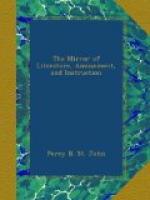MARMION.
Sir Walter’s second poem of consequence appeared in 1808, he having published a few ballads and lyrical pieces during the year 1806. The publishers, emboldened by the success of the Lay of the Last Minstrel, gave the author 1,000_l._ for Marmion. Its success was electric, and at once wrought up the poet’s reputation. In his preface to the last edition, April, 1830, he states 36,000 copies to have been printed between 1808 and 1825, besides a considerable sale since that period; and the publishers were so delighted with the success, as “to supply the author’s cellars with what is always an acceptable present to a young Scotch house-keeper—namely, a hogshead of excellent claret.”
CLERK OF SESSION.
Between the appearance of the Lay of the Last Minstrel and Marmion, hopes were held out to him from an influential quarter of the reversion of the office of a Principal Clerk in the Court of Session; and, Mr. Pitt, having expressed a wish to be of service to the author, of the Lay of the Last Minstrel, Sir Walter applied for the reversion. His desire was readily acceeded to; and, according to Chambers, George III. is reported to have said, when he signed the commission, that “he was happy he had it in his power to reward a man of genius, and a person of such distinguished merit.” The King had signed the document, and the office fees alone remained to be paid, when Mr. Pitt died, and a new and opposite ministry succeeded. Sir Walter, however, obtained the appointment, though not from the favour of an administration differing from himself in politics, as has been supposed; the grant having been obtained before Mr. Fox’s direction that the appointment should be conferred as a favour coming directly from his administration. The duties were easy, and the profits about 1,200_l._ a year, though Sir Walter, according to arrangement, performed the former for five or six years without salary, until the retirement of his colleague.
EDITIONS OF DRYDEN AND SWIFT.
Sir Walter’s next literary labour was the editorship of the Works of John Dryden, with Notes. Critical and Explanatory, and a Life of the Author: the chief aim of which appears to be the arrangement of the “literary productions in their succession, as actuated by, and operating upon, the taste of an age, where they had so predominating an influence,” and the connexion of the Life of Dryden with the history of his publications. This he accomplished within a twelvemonth. Sir Walter subsequently edited, upon a similar plan, an edition of the Works of Swift.—Neither of these works can be said to entitle Sir Walter to high rank as a biographer.




